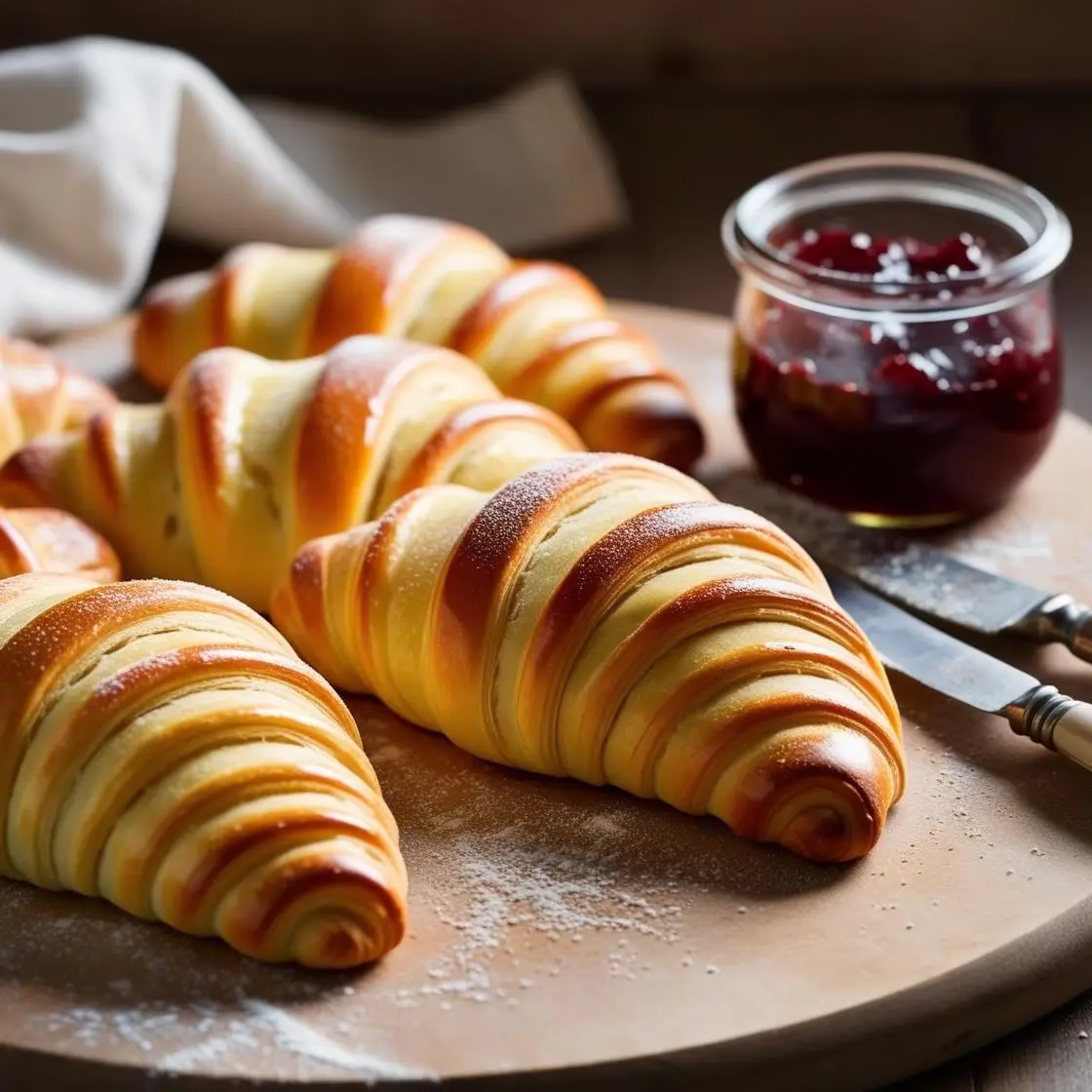Picture this: a crisp morning, sunlight filtering through the kitchen window, and the most intoxicating aroma of freshly baked pastries wafting through the air. Indeed, some of the best culinary discoveries happen quite accidentally. Moreover, today’s recipe is a testament to that very sentiment. Furthermore, my journey with Gipfeli began unexpectedly, thanks to my husband – a true culinary enthusiast with an insatiable appetite for global flavors.
Initially, I was skeptical about attempting this Swiss delicacy. However, after numerous attempts and countless flour-covered kitchen counters, I discovered the magic of Gipfeli. Not only is this pastry a delightful alternative to the traditional French croissant, but it also carries a unique Swiss charm that sets it apart from its more famous cousin. Consequently, what started as a mere cooking experiment transformed into a beloved family recipe that has become a weekend breakfast tradition.
Table of Content
Why I Love Gipfeli: A Culinary Memoir

There’s something magical about a recipe that transcends mere ingredients – a story that unfolds with each delicate fold of dough, each golden-brown crescent that emerges from the oven. My love affair with Gipfeli began on a crisp autumn morning, quite unexpectedly, during a conversation with my husband about his travels through Switzerland.
Beyond the technical perfection, beyond the layers of butter and flour, Gipfeli represents something deeper. It’s a testament to the universal language of food – how a simple recipe can bridge distances, tell stories, and create moments of pure, unadulterated joy.
I love that Gipfeli embraces imperfection. Not every crescent will be identical, not every layer will be perfectly even. And that’s precisely the point. Each Gipfeli is unique, a reflection of the hands that shaped it, the heart that created it.
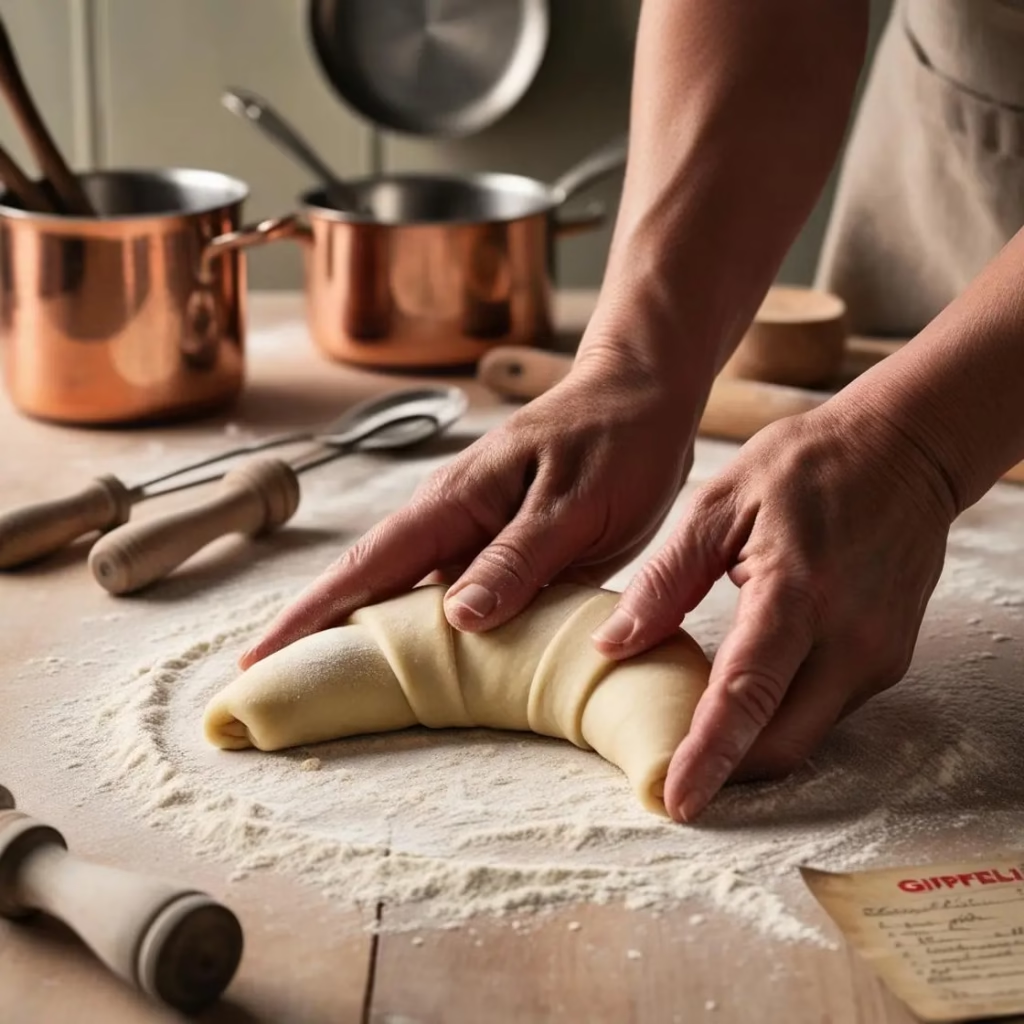
Ingredients You’ll Need
Gathering the right ingredients is crucial for creating authentic Gipfeli. Here’s what you’ll want to have on hand:
- 500g all-purpose flour
- 250ml warm milk
- 50g sugar
- 1 packet (about 7g) active dry yeast
- 1 teaspoon salt
- 250g cold unsalted butter, cut into small pieces
- 1 beaten egg
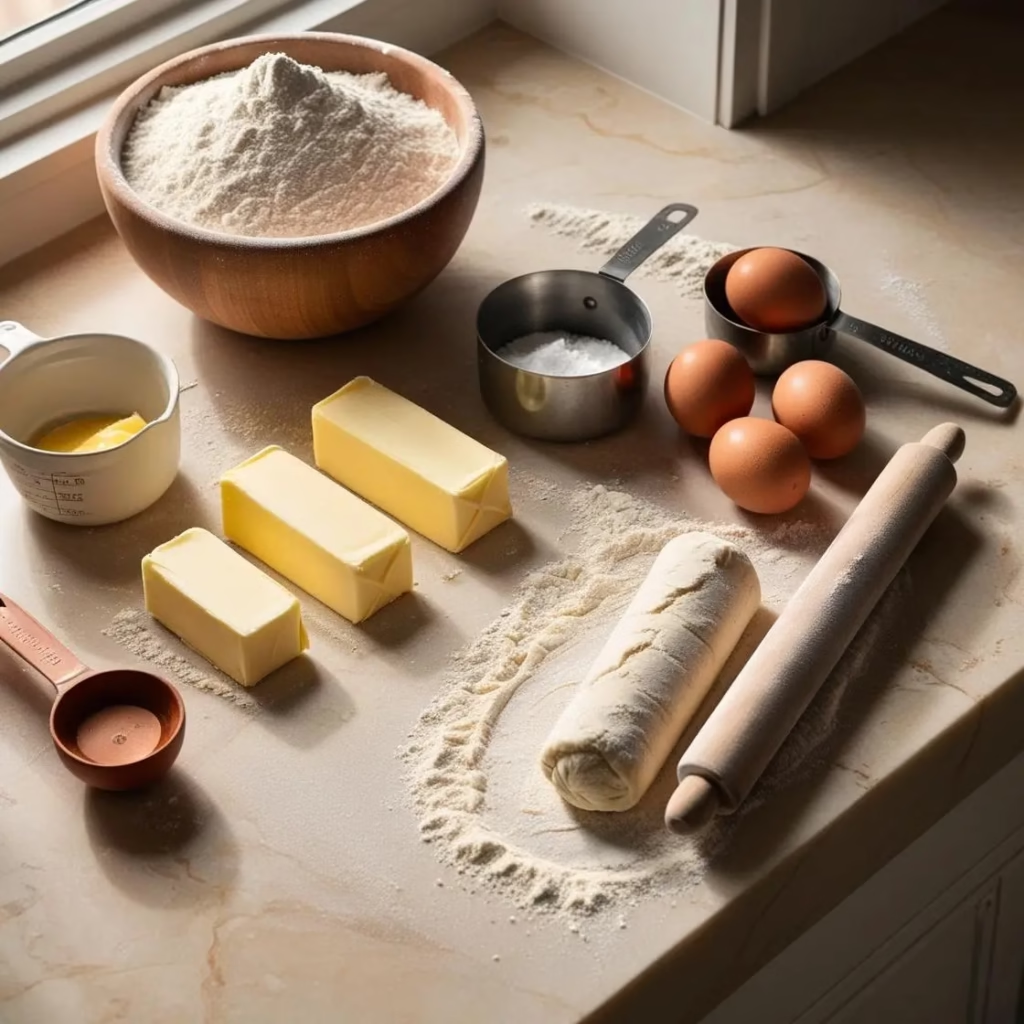
Step-by-Step Gipfeli Making Process
- Activate the Yeast: Start by mixing the warm milk with the yeast. Let it sit for a few minutes until it becomes slightly frothy. The key is warm milk, not hot – you want to wake up the yeast, not kill it.
- Prepare the Dry Ingredients: In a large mixing bowl, combine the flour, sugar, and salt. Create a small well in the center – this is where the magic begins.
- Combine Wet and Dry: Pour the yeast mixture into the well. Slowly incorporate the ingredients, mixing until a soft dough forms. This is where your arm muscles get a workout!
- Knead to Perfection: Transfer the dough to a floured surface and knead for about 10 minutes. The goal is a smooth, elastic dough that springs back when touched.
- First Rise: Place the dough in a greased bowl, cover with a clean kitchen towel, and let it rise for approximately one hour. This is your first test of patience.
- Butter Lamination: Here’s where Gipfeli gets its signature flaky texture. Roll out the dough into a large rectangle. Place cold butter pieces on one half, then fold the other half over. Seal the edges carefully.
- Folding Technique: Roll the dough out again, then fold it in thirds like a letter. Repeat this process two more times. This creates those delicate, buttery layers.
- Chill Out: Wrap the dough and refrigerate for about an hour. This helps develop flavor and makes the dough easier to work with.
- Shape the Gipfeli: Roll out the chilled dough and cut into triangles. Starting from the wide end, roll each triangle towards the point to create that classic crescent shape.
- Final Rise and Bake: Let the shaped Gipfeli rise for 30 minutes. Preheat your oven to 200°C (400°F). Brush with beaten egg for that golden shine.
- Baking: Bake for 15-20 minutes until beautifully golden and puffy. The aroma will be absolutely irresistible!
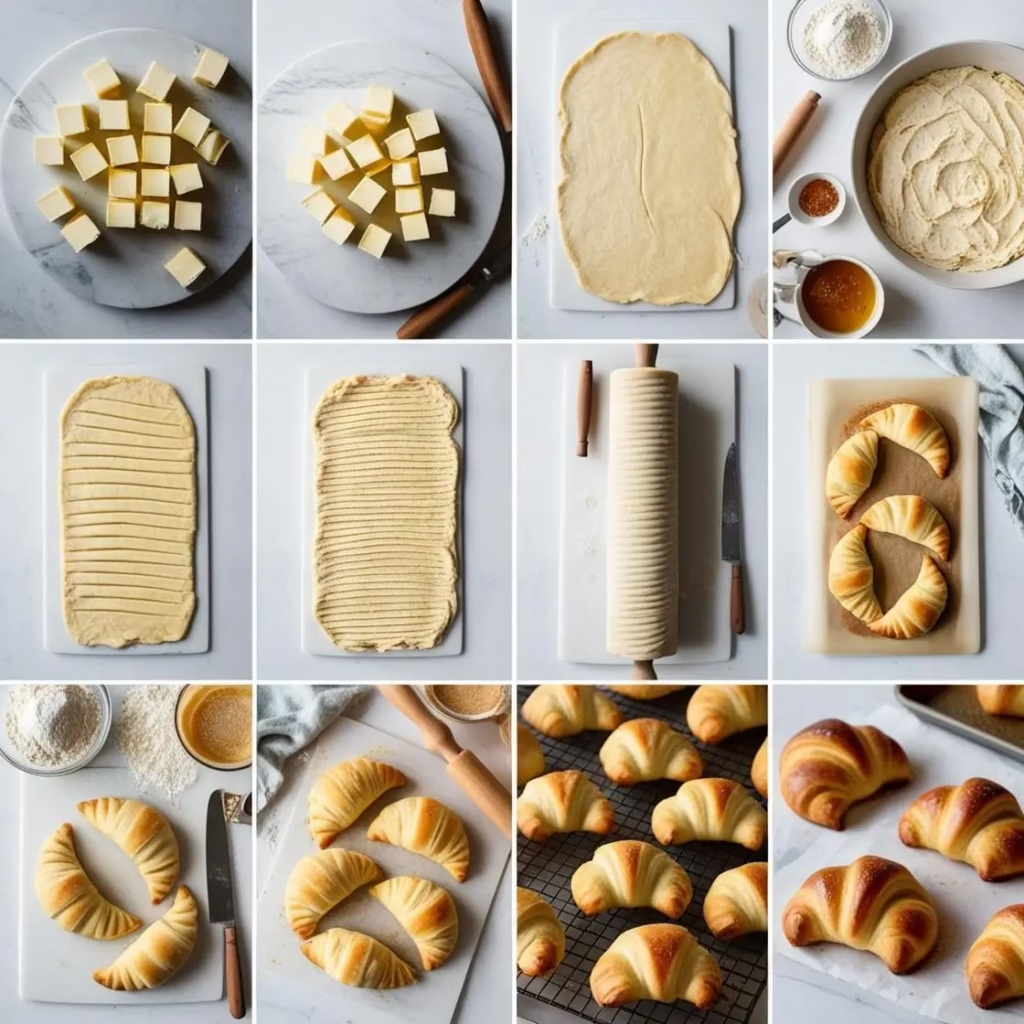
Pro Tips for Perfect Gipfeli
- Keep your butter ice-cold – this is crucial for those flaky layers
- Use warm (not hot) milk when working with yeast
- Flour your work surface generously to prevent sticking
- Roll the dough gently and evenly
- Practice makes perfect when rolling the crescents

Serving Suggestions
Gipfeli are incredibly versatile. Enjoy them:
- With a hot cup of coffee
- Spread with homemade jam
- Alongside scrambled eggs
- Paired with a fresh fruit smoothie
- Filled with chicken salad for a savory twist

Frequently Asked Questions
Undoubtedly, you might have several questions swirling in your mind about creating the perfect Gipfeli. Therefore, let’s address some of the most common queries:
Do I really need to use egg wash?
Absolutely! Furthermore, the egg wash is crucial as it provides Gipfeli with that beautiful golden-brown color and an appetizing shine. In fact, this simple step can elevate your pastry from good to extraordinary.
Can I prepare the dough in advance?
Certainly! Moreover, preparing the dough ahead of time can be a game-changer for busy home bakers. Specifically, you can refrigerate the dough overnight and seamlessly continue the process the next day. Consequently, this makes Gipfeli an incredibly convenient recipe for planned breakfasts or brunches.
How can I make my Gipfeli extra flaky?
Excellent question! Notably, the secret lies in two key factors. First, ensure your butter is extremely cold. Additionally, handle the dough as minimally as possible. In other words, treat the dough like a delicate treasure, and you’ll be rewarded with irresistibly flaky layers.
What if I don’t have all the exact ingredients?
While precision is important, don’t be discouraged. Nevertheless, slight variations can still yield delicious results. For instance, you might substitute milk with a non-dairy alternative or adjust sugar levels slightly. However, always maintain the core technique and ingredient ratios.
Can beginners really make Gipfeli?
Absolutely! Although the process might seem complex, every expert baker started exactly where you are now. Moreover, with patience, practice, and a willingness to learn, even novice bakers can master this delightful Swiss pastry.
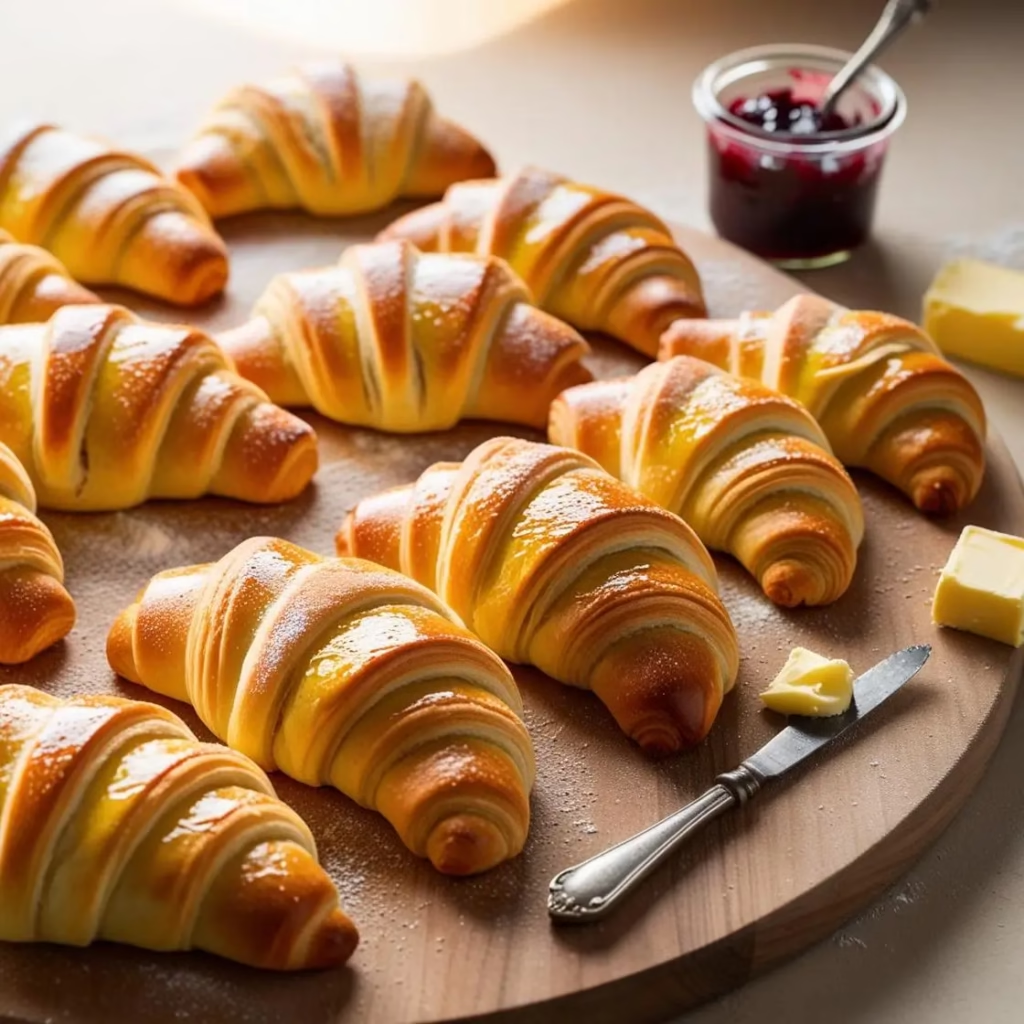
Nutritional Information (Approximate per Gipfeli)
- Calories: 300
- Fat: 18g
- Carbohydrates: 30g
- Protein: 5g
Other Breakfast Recipe
- Hawaiian Roll French Toast
- Date Nut Bread
- Blackberry Cheesecake
- Chocolate Chip Muffins
- Up-and-go breakfast muffins!

Creating Gipfeli at home is far more than a mere baking exercise – it’s a culinary journey of love, patience, and discovery. Initially, the process might appear intimidating, yet each careful step brings you closer to a truly remarkable pastry. Consequently, don’t be disheartened if your first batch isn’t picture-perfect.
Furthermore, baking is an art form that celebrates imperfection. Indeed, every slightly uneven crescent tells a story of learning and passion. Moreover, the joy of baking lies not just in the final product, but in the process of creation itself.
Therefore, I encourage you to roll up your sleeves, generously dust your countertop with flour, and fearlessly embark on this delicious Swiss baking adventure. Ultimately, your taste buds – and perhaps your surprised family and friends – will express endless gratitude!

How to Make the Perfect Gipfeli: A Simple Step-by-Step Recipe
Description
Discover the ultimate Swiss Gipfeli recipe: a buttery, flaky croissant-like pastry that’ll transform your breakfast. Easy-to-follow steps, pro tips, and mouthwatering results guaranteed. Perfect for baking enthusiasts and breakfast lovers!
Ingredients
Instructions
- In a small bowl, combine warm milk with yeast
- Let sit for 5-10 minutes until slightly frothy
- Ensure milk is warm, not hot (110°F/43°C)
- In a large mixing bowl, whisk together flour, sugar, and salt
- Create a well in the center of the dry ingredients
- Pour activated yeast mixture into the well
- Gradually mix until a shaggy dough forms
- Knead on a floured surface for 10 minutes
- Dough should be smooth and elastic
- Keep butter very cold
- Cut butter into small, uniform cubes
- Chill butter cubes if they’ve warmed up
- Roll dough into a large rectangle (about 16×10 inches)
- Spread cold butter cubes on one half of the dough
- Fold the other half over the butter
- Seal edges completely
- Roll dough out into a long rectangle
- Fold into thirds like a letter
- Rotate 90 degrees
- Repeat rolling and folding two more times
- This creates flaky layers
- Wrap dough in plastic wrap
- Refrigerate for 1 hour
- This relaxes the gluten and solidifies butter layers
- Remove dough from refrigerator
- Roll into a large, thin rectangle
- Cut into triangular shapes (about 4 inches wide at base)
- Start at the wide end of each triangle
- Gently roll towards the pointed tip
- Curve ends slightly to create crescent shape
- Place on parchment-lined baking sheet
- Cover shaped Gipfeli with a damp kitchen towel
- Let rise in a warm place for 30-45 minutes
- Dough should look puffy and almost doubled
- Preheat oven to 400°F (200°C)
- Beat 1 egg for egg wash
- Gently brush each Gipfeli with egg wash
- Bake for 15-20 minutes
- Look for golden brown color
- Pastries should be puffed and crisp
Preparing the Dough
Activate Yeast:
Mix Dry Ingredients:
Form Initial Dough:
Laminating the Dough
Butter Preparation:
First Lamination:
Folding Technique:
Chilling:
Shaping Gipfeli
Roll and Cut:
Forming Crescents:
Final Rise:
Baking
Prepare for Baking:
Bake:
Notes
- Keep all ingredients cold
Don’t rush the lamination process
Use a ruler for precise measurements
Patience is key to perfect Gipfeli

